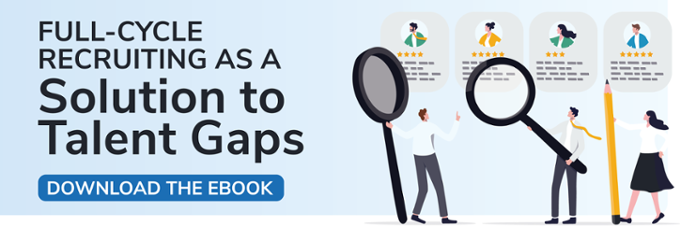Topic Retention
Talent Acquisition vs. Talent Management: Key Differences

June 16, 2023 | By Questco Companies

Both talent acquisition and talent management play a crucial role in the success of an organization.
By understanding the nuances between these two processes, HR professionals can create a well-rounded approach to workforce management, fostering a positive organizational culture and promoting employee growth and advancement.
Talent Acquisition
Talent acquisition is attracting, identifying, and hiring suitable candidates to meet an organization’s talent needs. The role often involves job sourcing, employer branding, and candidate experience, which contribute to attracting the best talent in a competitive market.
The Recruitment Process
Recruitment begins with identifying talent needs and defining the job requirements. This step involves workforce planning and understanding the skills gap within the organization.
Afterward, HR professionals source candidates through various channels, such as job boards, social media, and employee referrals.
Screening and selection evaluate candidates based on their skills, experience, and cultural fit. This is followed by conducting job interviews to determine the best fit for the role. Once the right candidate has been selected, onboarding ensures a smooth transition for new employees, setting them up for success in their new positions.
Key Strategies for Effective Talent Acquisition
Effective talent acquisition requires a strategic approach, which includes developing a strong employer brand. This brand represents the organization’s identity and values and helps attract potential candidates who align with the company culture. HR technology and data analytics can streamline recruitment and provide insights for making informed decisions.
Implementing diversity, equity, and inclusion initiatives ensures a more inclusive hiring process, promoting workforce diversity and fostering innovation within the organization.
At the same time, offering competitive compensation and benefits packages can further entice top talent to join the company.
Challenges in Talent Acquisition
Talent acquisition’s challenges include competition for top talent and evolving skill requirements.
As organizations vie for the best candidates, HR professionals must develop innovative strategies to stand out in the market.
Adapting to remote work and digital environments is another challenge that requires organizations to rethink their talent acquisition strategies and leverage technology to attract and engage candidates effectively.
Talent Management
Talent management focuses on nurturing and developing the skills and competencies of an organization’s workforce, ensuring that employees contribute to the company’s success while achieving their career goals. This covers employee retention, performance management, learning and development, and succession planning.
Talent management enables organizations to create an environment where employees feel valued, engaged, and motivated to perform at their best.

Components of Talent Management
Performance management is a crucial aspect of talent management that involves setting goals, providing feedback, and evaluating employees’ progress. This helps employees understand their strengths and areas for improvement, allowing them to grow and excel in their roles.
Learning and development initiatives support employees in acquiring new skills and knowledge, enabling them to adapt to changing business needs and advance in their careers.
Career pathing and succession planning ensure that employees have a clear understanding of their growth opportunities within the organization, while also preparing future leaders to take on critical roles.
Lastly, employee engagement and retention strategies focus on creating a positive work environment that fosters loyalty and commitment, reducing turnover and promoting long-term success.
Key Strategies for Effective Talent Management
Creating a culture of continuous learning is essential for effective talent management. This culture encourages employees to develop skills and knowledge, driving innovation and business growth.
In addition, implementing effective performance evaluation systems allows organizations to measure employee progress and provide constructive feedback, enabling individuals to excel in their roles.
Fostering a positive work environment, where employees feel valued and supported, also contributes to higher engagement and job satisfaction. Personalized development opportunities, such as training programs and mentorship, can further empower employees to reach their full potential and contribute to the organization’s success.
Challenges in Talent Management
Talent management’s challenges include retaining high-performing employees and developing leadership skills. As employees’ expectations and workforce needs change, organizations must adapt their talent management strategies to ensure continued engagement and growth.
Differences between Talent Acquisition and Talent Management
While talent acquisition and management are essential components of HR, they have distinct scopes and objectives. Talent acquisition focuses on attracting and hiring new employees to meet the organization’s talent needs, while talent management centers on nurturing and developing the existing workforce.
The primary goal of talent acquisition is to find the right candidates for the job, while talent management aims to retain, engage, and develop employees for long-term success.
Timeframe and Focus
Talent acquisition typically has a short-term focus, as it addresses immediate talent needs and organizational vacancies. Conversely, talent management has a long-term perspective, concentrating on employees’ career growth, performance, and succession planning. Talent acquisition focuses on bringing new employees on board, while talent management is concerned with the ongoing development and retention of the workforce.
Roles and Responsibilities of HR Professionals
In talent acquisition, HR professionals are responsible for job sourcing, candidate selection, and onboarding new employees. They must ensure a smooth recruitment process that attracts and secures the best talent available.
In talent management, HR professionals are tasked with performance management, learning and development initiatives, and employee engagement strategies. Their goal is to create a positive organizational culture that encourages growth and fosters employee loyalty.
Use of Technology and Data Analytics
Both talent acquisition and talent management use technology and data analytics, but in different ways.
In talent acquisition, HR technology helps streamline the recruitment process, while data analytics provide insights into candidate selection and employer branding strategies.
In talent management, technology enables efficient performance management and learning and development initiatives, while data analytics can identify trends and areas for improvement in employee engagement and retention.
Impact on Organizational Culture and Employee Experience
Talent acquisition influences organizational culture and employee experience by attracting candidates who align with the company’s values and ensuring a smooth onboarding process. Talent management, on the other hand, shapes the culture and experience by creating a supportive and growth-oriented environment that promotes employee engagement, learning, and development.

The Synergy between Talent Acquisition and Talent Management
Organizations must align their talent acquisition and talent management strategies to optimize workforce management and achieve long-term success.
An integrated approach ensures that the recruitment process focuses on hiring candidates who are not only suitable for the job but also likely to thrive in the company’s culture and contribute to its objectives. This creates a seamless employee experience, from the recruitment stage to ongoing career development and growth.
Similarly, HR professionals can leverage the data gathered during recruitment to inform and customize talent management initiatives, such as personalized learning and development plans. This approach ensures that employees receive the support and resources they need to excel in their roles and contribute to the organization’s success from the start.
Acquisition and Management of Talent
Talent acquisition and talent management are two distinct but interconnected components of human resources management. Both processes play a vital role in creating a strong, diverse talent pipeline, and understanding their distinctions is crucial for effective workforce management.
As the business landscape continues to evolve, HR professionals must adapt their talent acquisition and management strategies to meet the changing needs of their workforce. By doing so, they can drive their organizations forward and ensure a positive, growth-oriented work environment that benefits both employees and the organization as a whole.




